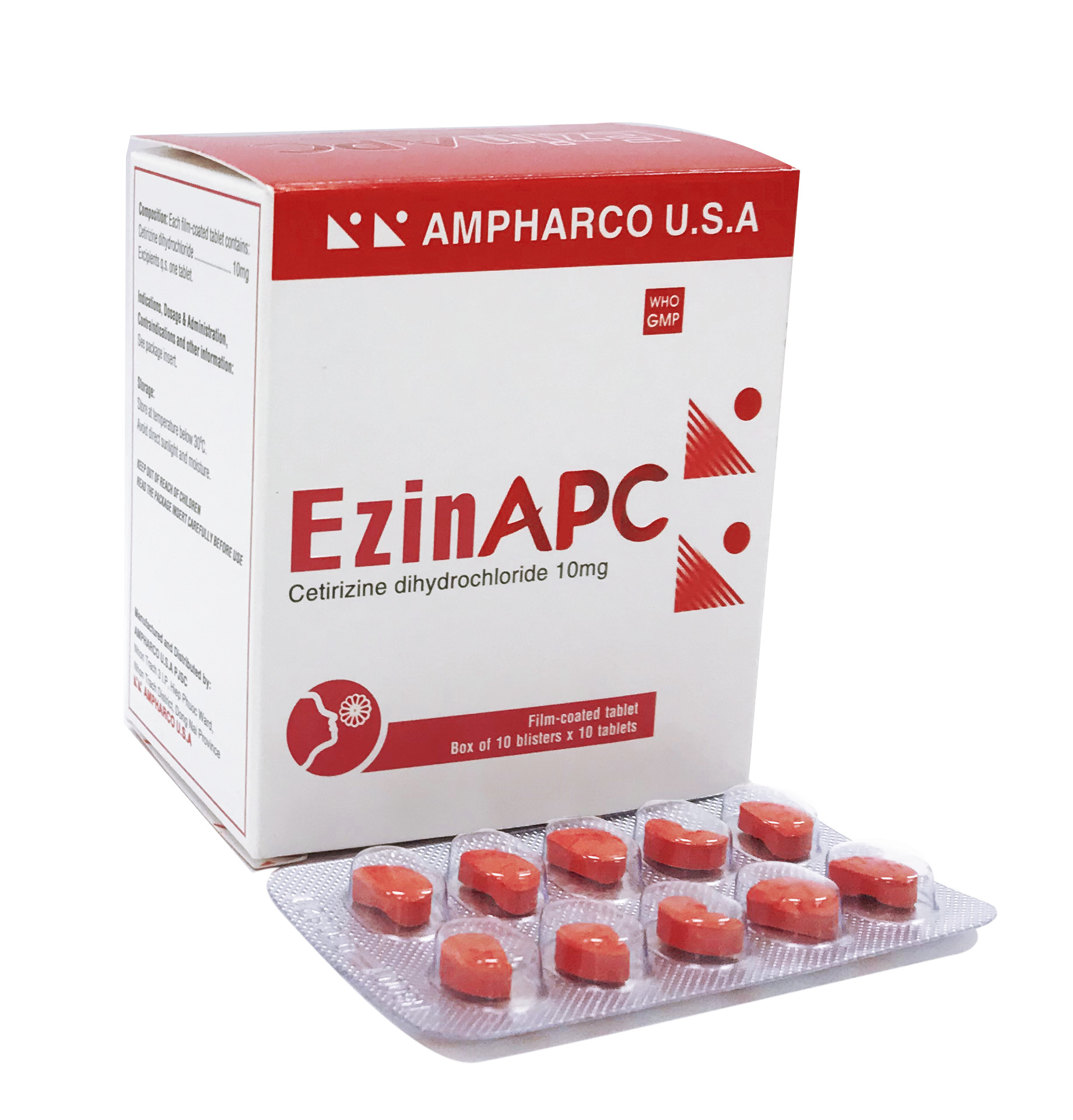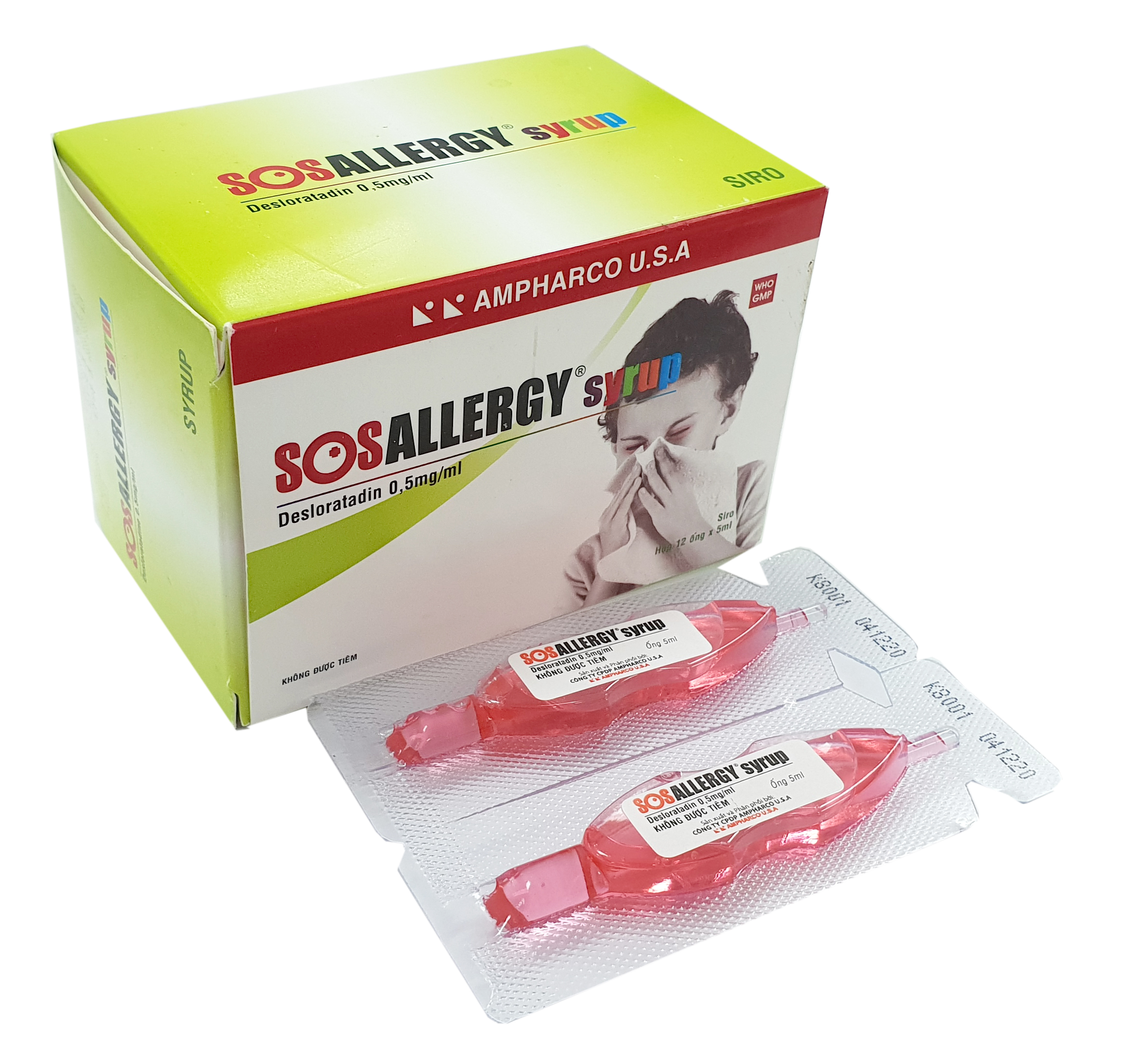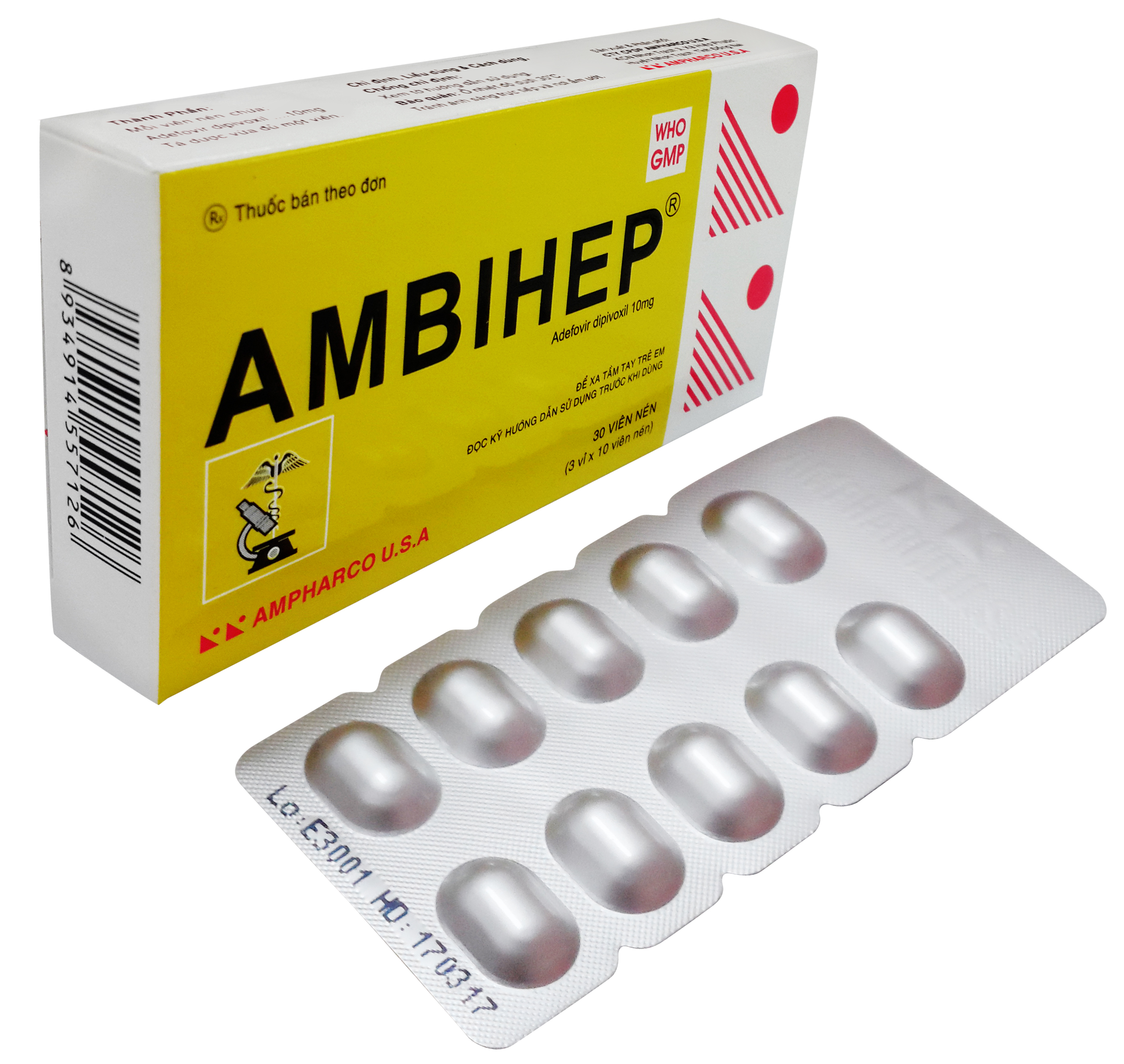AMBIHEP is indicated for the treatment of chronic hepatitis B in patients 12 years of age and older with evidence of active viral replication and either evidence of persistent elevations in serum aminotransferases (ALT or AST) or histologically active disease.
This indication is based on histological, virological, biochemical, and serological responses in adult patients with HBeAg+ and HBeAg-chronic hepatitis B with compensated liver function, and with clinical evidence of lamivudine-resistant hepatitis B virus with either compensated or decompensated liver function.
For patients 12 to less than 18 years of age, the indication is based on virological and biochemical responses in patients with HBeAg+ chronic hepatitis B virus infection with compensated liver function.
Specifications
AMBIHEP
COMPOSITION: Each tablet contains:
Adefovirdipivoxil............................................. 10 mg
Excipients: Copovidone, Lactose, Microcrystalline cellulose, Colloidal anhydrous silica, Croscarmellose sodium, Talc, Magnesium stearate.
INDICATIONS:
AMBIHEP is indicated for the treatment of chronic hepatitis B in patients 12 years of age and older with evidence of active viral replication and either evidence of persistent elevations in serum aminotransferases (ALT or AST) or histologically active disease.
This indication is based on histological, virological, biochemical, and serological responses in adult patients with HBeAg+ and HBeAg-chronic hepatitis B with compensated liver function, and with clinical evidence of lamivudine-resistant hepatitis B virus with either compensated or decompensated liver function.
For patients 12 to less than 18 years of age, the indication is based on virological and biochemical responses in patients with HBeAg+ chronic hepatitis B virus infection with compensated liver function.
DOSAGE AND ADMINISTRATION:
Therapy should be initiated by a physician experienced in the management of chronic hepatitis B.
The recommended dose of AMBIHEP in chronic hepatitis B for patients 12 years of age and older with adequate renal function is 10 mg, once daily, taken orally, with or without food. The optimum duration of treatment is unknown.
In patients with decompensated liver disease, adefovir should always be used in combination with a second agent, without cross-resistance to adefovir, to reduce the risk of resistance and to achieve rapid viral suppression.
AMBIHEP is not recommended for use in children less than 12 years of age.
Elderly: No data are available to support a dose recommendation for patients over the age of 65 years.
Renal impairment: significantly increased drug exposures were seen when adefovir was administered to patients with renal impairment. Therefore, the dosing interval of adefovir should be adjusted in patients with baseline creatinine clearance < 50 mL/min using the following suggested guidelines:
|
|
Creatinine Clearance (mL/min)* |
|||
|
|
≥50 |
30 - 49 |
10 - 29 |
Hemodialysis Patients |
|
Recommended Dose and Dosing Interval |
10 mg every 24h |
10 mg every 48h |
10 mg every 72h |
10 mg every 7 day following dialysis |
|
* Creatinine clearance calculated by Cockcroft-Gault method using lean or ideal body weight. The pharmacokinetics of adefovir have not been evaluated in non-hemodialysis patients with creatinine clearance < 10 mL/min; therefore, no dosing recommendation is available for these patients. |
||||
Hepatic impairment: No dose adjustment is required in patients with hepatic impairment.
In order to reduce the risk of resistance in patients receiving adefovirdipivoxilmonotherapy, a modification of treatment should be considered if serum HBV DNA remains above 1,000 copies/ml at or beyond 1 year of treatment.
CONTRAINDICATIONS
Hypersensitive to any of its ingredient(s).
WARNINGS AND PRECAUTIONS
General: patients should be advised that therapy with adefovirdipivoxil has not been proven to reduce the risk of transmission of hepatitis B virus to others and therefore appropriate precautions should still be taken.
Renal function: long-term treatment with adefovirdipivoxil may increase the risk of renal impairment. While the overall risk of renal impairment in patients with adequate renal function is low, this is of special importance in patients both at risk of or having underlying renal dysfunction, and also in patients receiving medicinal products that may affect renal function. It is recommended that creatinine clearance is calculated in all patients prior to initiating therapy with adefovirdipivoxil and that renal function (creatinine clearance and serum phosphate) be monitored every four weeks during the first year and then every three months thereafter. In patients at risk for renal impairment, consideration should be given to more frequent monitoring of renal function.
In patients who develop renal insufficiency and have advanced liver disease or cirrhosis, dosing interval adjustment of adefovir or switch to an alternative therapy for hepatitis B infection should be considered. Treatment cessation for chronic hepatitis B in these patients is not recommended.
Patients receiving medicinal products that may affect renal function:adefovirdipivoxil should not be administered concurrently with tenofovirdisoproxilfumarate. Caution is advised in patients receiving other medicinal products that may affect renal function or are excreted renally (e.g. cyclosporin and tacrolimus, intravenous aminoglycosides, amphotericin B, foscarnet, pentamidine, vancomycin, or medicinal products which are secreted by the same renal transporter, human Organic Anion Transporter 1 (hOAT1), such as cidofovir). Co-administration of 10 mg adefovirdipivoxil with medicinal products in these patients may lead to an increase in serum concentrations of either adefovir or a co-administered medicinal product. The renal function of these patients should be closely monitored with a frequency tailored to the individual patient's medical condition.
Hepatic function: Spontaneous exacerbations in chronic hepatitis B are relatively common and are characterised by transient increases in serum ALT. After initiating antiviral therapy, serum ALT may increase in some patients as serum HBV DNA levels decline. In patients with compensated liver disease, these increases in serum ALT are generally not accompanied by an increase in serum bilirubin concentrations or hepatic decompensation.
Patients with advanced liver disease or cirrhosis may be at a higher risk for hepatic decompensation following hepatitis exacerbation which may be fatal. In these patients, including patients with decompensated liver disease, treatment cessation is not recommended and these patients should be monitored closely during therapy.
If treatment cessation is necessary, patients should be closely monitored for several months after stopping treatment as exacerbations of hepatitis have occurred after discontinuation of 10 mg adefovirdipivoxil. Most post-treatment exacerbations of hepatitis were seen within 12 weeks of discontinuation of 10 mg adefovirdipivoxil.
Lactic acidosis and severe hepatomegaly with steatosis: Occurrences of lactic acidosis (in the absence of hypoxaemia), sometimes fatal, usually associated with severe hepatomegaly and hepatic steatosis, have been reported with the use of nucleoside analogues. As adefovir is structurally related to nucleoside analogues, this risk cannot be excluded. Treatment with nucleoside analogues should be discontinued when rapidly elevating aminotransferase levels, progressive hepatomegaly or metabolic/lactic acidosis of unknown aetiology occur. Benign digestive symptoms, such as nausea, vomiting and abdominal pain, might be indicative of lactic acidosis development. Severe cases, sometimes with fatal outcome, were associated with pancreatitis, liver failure/hepatic steatosis, renal failure and higher levels of serum lactate. Caution should be exercised when prescribing nucleoside analogues to any patient (particularly obese women) with hepatomegaly, hepatitis or other known risk factors for liver disease. These patients should be followed closely.
To differentiate between elevations in transaminases due to response to treatment and increases potentially related to lactic acidosis, physicians should ensure that changes in ALT are associated with improvements in other laboratory markers of chronic hepatitis B.
Co-infection with hepatitis C or D: There are no data on the efficacy of adefovirdipivoxil in patients co-infected with hepatitis C or hepatitis D.
Co-infection with HIV: Limited data are available on the safety and efficacy of 10 mg adefovirdipivoxil in patients with chronic hepatitis B, co-infected with HIV. To date there is no evidence that daily dosing with 10 mg adefovirdipivoxil results in emergence of adefovir associated resistance mutations in the HIV reverse transcriptase. Nonetheless, there is a potential risk of selection of HIV strains resistant to adefovir with possible cross-resistance to other antiviral medicinal products.
As far as possible, treatment of hepatitis B by adefovirdipivoxil in an HIV co-infected patient should be reserved for patients whose HIV RNA is controlled. Treatment with 10 mg adefovirdipivoxil has not been shown to be effective against HIV replication and therefore should not be used to control HIV infection.
Elderly: The clinical experience in patients > 65 years of age is very limited. Caution should be exercised when prescribing adefovirdipivoxil to the elderly, keeping in mind the greater frequency of decreased renal or cardiac function in these patients, and the increase in concomitant diseases or concomitant use of other medicinal products in the elderly.
Resistance: Resistance to adefovirdipivoxil can result in viral load rebound which may result in exacerbation of hepatitis B and, in the setting of diminished hepatic function, lead to liver decompensation and possible fatal outcome. Virological response should be closely monitored in patients treated with adefovirdipivoxil, with HBV DNA measured every 3 months. If viral rebound occurs, resistance testing should be performed. In case of emergence of resistance, treatment should be modified.
AMBIHEP contains lactose. Consequently, patients with rare hereditary problems of galactose intolerance, the Lapp lactase deficiency, or glucose-galactosemalabsorption should not take this medicinal product.
Pregnant women:
There are limited data on the use of adefovirdipivoxil in pregnant women. Adefovirdipivoxil is not recommended during pregnancy and in women of childbearing potential not using contraception. Adefovirdipivoxil should be used during pregnancy only if the potential benefit justifies the potential risk to the foetus.
There are no data on the effect of adefovirdipivoxil on transmission of HBV from mother to infant. Therefore, the standard recommended procedures for immunisation of infants should be followed to prevent neonatal acquisition of HBV.
Lactating women:
It is not known whether adefovir is excreted in human milk. Mothers should be instructed not to breast-feed if they are taking adefovir.
PRESENTATION: Blister of 10 tablets, box of 3 blisters.
Keep out of reach of children
Read the package insert carefully before use
Ask your doctor for further information
Use upon doctor’s prescription only
Manufactured and Distributed by: AMPHARCO U.S.A PHARMACEUTICAL JOINT-STOCK COMPANY
NhonTrach 3 Industrial Park, HiepPhuoc Ward, NhonTrach District, Dong Nai Province
Tel: 02513 566 202 - Fax: 02513 566 203







